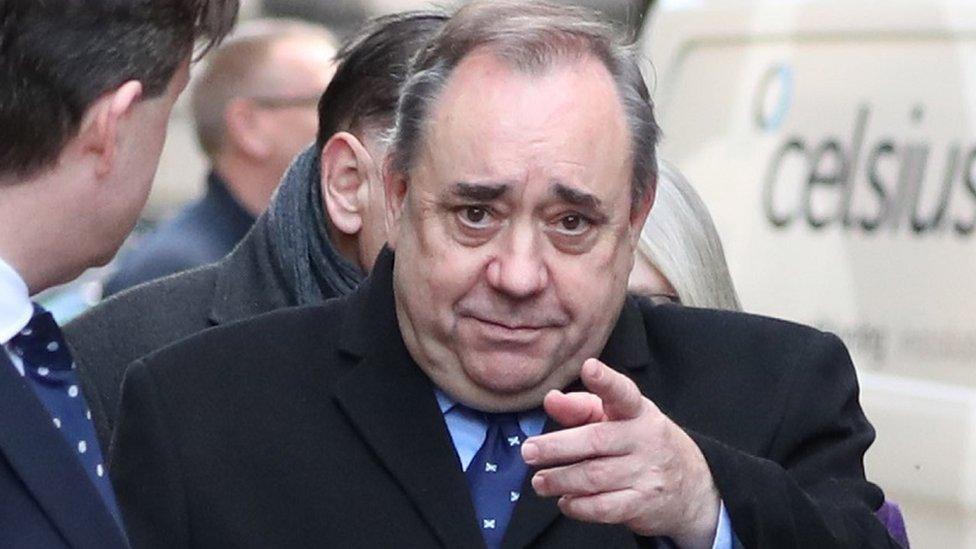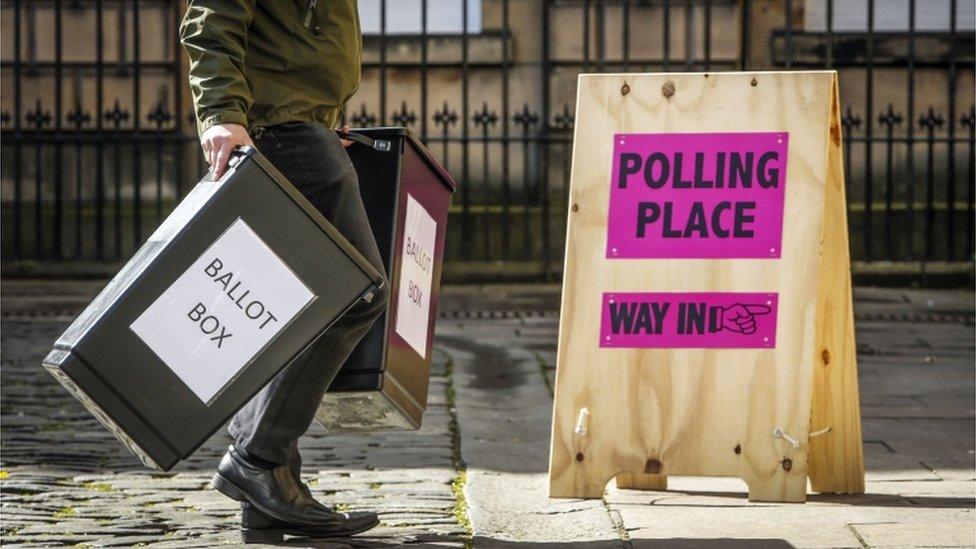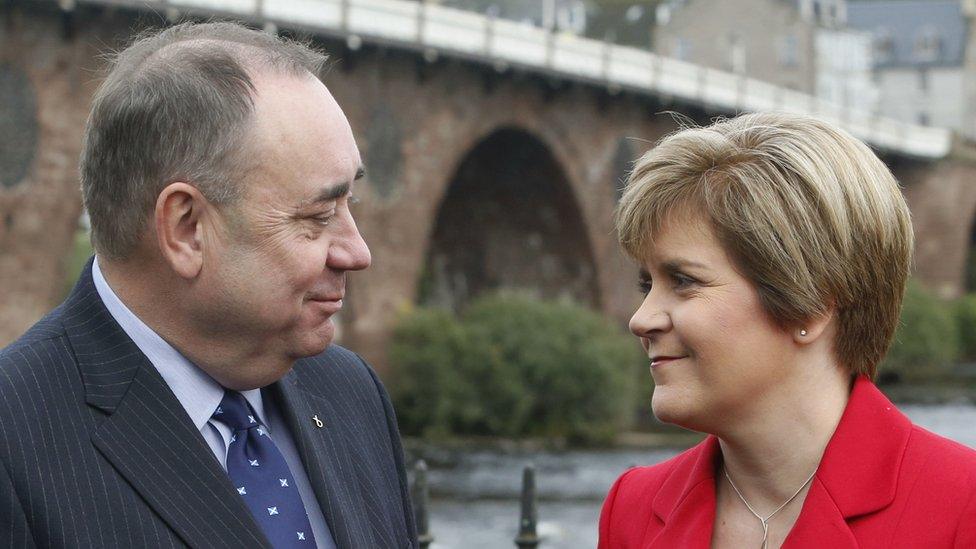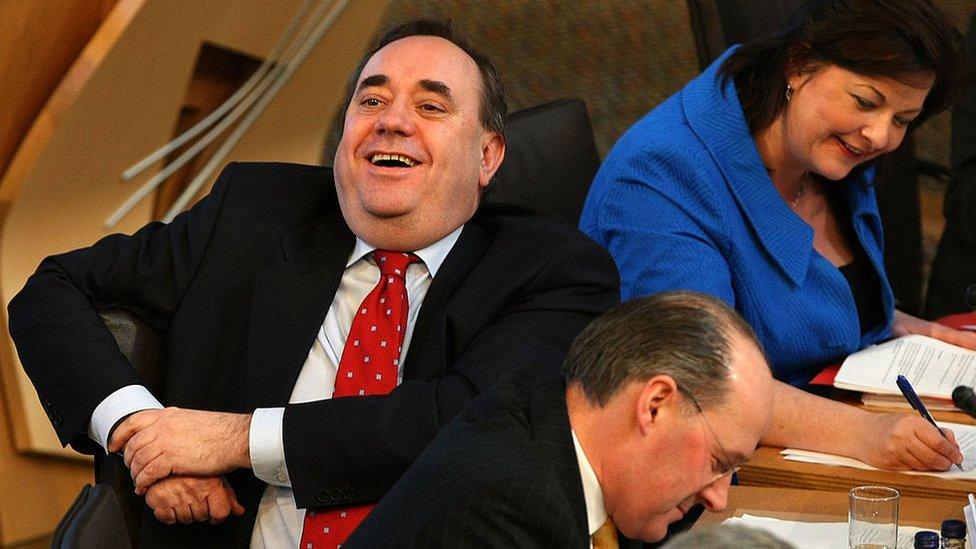What does Alex Salmond's new party mean for the election?
- Published

The return of Alex Salmond to the political fray has sent a shockwave through the Holyrood election campaign.
Few would have imagined in the years that followed his defeat as an MP in the 2017 general election that his comeback would be at the helm of a new party.
He insists that Alba is not a threat to the SNP. But given he has also announced a series of high-profile defections, the idea of a split seems inescapable.
Mr Salmond believes that adding a bloc of Alba Party MSPs would create an independence "supermajority" at Holyrood.
The former first minister has no designs on going back into government, in a coalition or other formal agreement with the SNP.
He may hope his group could act a bit like a pressure group that has enough votes to bend the rest of parliament to its will, and hold First Minister Nicola Sturgeon's feet to the fire on a second independence referendum.
It remains to be seen if there is a public appetite for Mr Salmond's new vehicle.
But by running candidates across Scotland, it has the potential to change the nature of the race in more or less every seat - partly because of the way Scotland's voting system works.

Under that system, MSPs can be elected either as a representative of a constituency, or from one of eight regions of Scotland using a "top up" system of proportional representation.
The more constituency seats you win in any area, the harder it is to win list seats. In 2016, the SNP won the vast majority of constituency seats - and as a direct result returned just four regional list MSPs.
Mr Salmond believes this means most SNP list votes are "wasted", and could instead be given to his new list-only party - which would have zero constituency MSPs, and thus a better chance of winning regional seats.
However, the SNP cannot afford to just ignore the lists. When they won a majority in 2011, it was with the help of no fewer than 16 list seats.
They are unlikely to win every single constituency, and thus must try to balance out any local defeats with list seats - from a pragmatic standpoint, their campaign has to be "both votes SNP".

The campaign could now see Mr Salmond and Ms Sturgeon go head to head again
There is an impact on other parties beyond the SNP, too. Two start-up groups, Action for Independence and the Independence for Scotland Party, have already withdrawn all of their candidates in support of Mr Salmond's goals.
The Scottish Greens stand primarily on the regional lists, and usually aim to sweep up the "second votes" of pro-independence types who vote SNP in their constituencies.
The party has put independence at the heart of its campaign for 2021, pledging that all of its MSPs in the next term will back a push for indyref2.
The likes of the Conservatives, Labour and Liberal Democrats will no doubt have watched Mr Salmond's announcement with popcorn in hand, hoping it will put a dent in the SNP's electoral juggernaut.
However, there are only 56 list seats to go around, so even the Unionist parties might be casting a nervous eye over the margins in some regions.
They might not be chasing the same voters, but they could still face being edged out if Alba wins some of those seats.

SCOTLAND'S ELECTION: THE BASICS
What elections are happening? On 6 May, people across Scotland will vote to elect 129 Members of the Scottish Parliament (MSPs). The party that wins the most seats will form the Scottish government. Find out more here.
What powers does the Scottish Parliament have? MSPs pass laws on most aspects of day-to-day life in Scotland, such as health, education and transport. They also have control over some taxes and welfare benefits. Defence, foreign policy and immigration are decided by the UK Parliament.
How do I vote? Anyone who lives in Scotland and is registered to vote is eligible, so long as they are aged 16 or over on the day of the election. You can register to vote online, external.

There may be two different ways of winning seats at Holyrood, and two different ballot papers - but there is only one campaign.
The emergence of a new party could have a huge impact on the debate as a whole, and on the questions posed each day - potentially recasting the whole campaign.
Nicola Sturgeon had hoped to spend this campaign talking about her pandemic leadership, and about her vision for independence - not Alex Salmond's.
Now, she may be doomed to the "Sturgeon vs Salmond" psychodrama of recent months dragging on for another six weeks.

One immediate example of how Mr Salmond may change the debate was when he was asked about an independence referendum at the Alba launch event, and mused about what other routes there may be to securing self-determination.
So already there are questions for Ms Sturgeon about her strategy. She could now be continually asked to react to Mr Salmond's position on independence, rather than dictating the debate on a topic which should really be home turf for her.
Mr Salmond also wants to move on from the questions of recent years about the government's mishandling of complaints against him and about the "malicious plot" he claims there was against him.
In every interview, he has been asked about his own conduct. Each time he responds that there have been several court cases and judges, a jury - which acquitted him of charges of sexual assault in March 2020 - and a number of inquiries. And that should be the end of the matter.
However, the problem for politicians is that they cannot control the questions they are asked on the campaign trail.
Mr Salmond will not be able to make questions about his past behaviour and the events of the last three years simply go away. If he is to make a success of his new party, he needs to maintain convincing answers to them.

POLICIES: Who should I vote for?
PODLITICAL: Updates from the campaign
